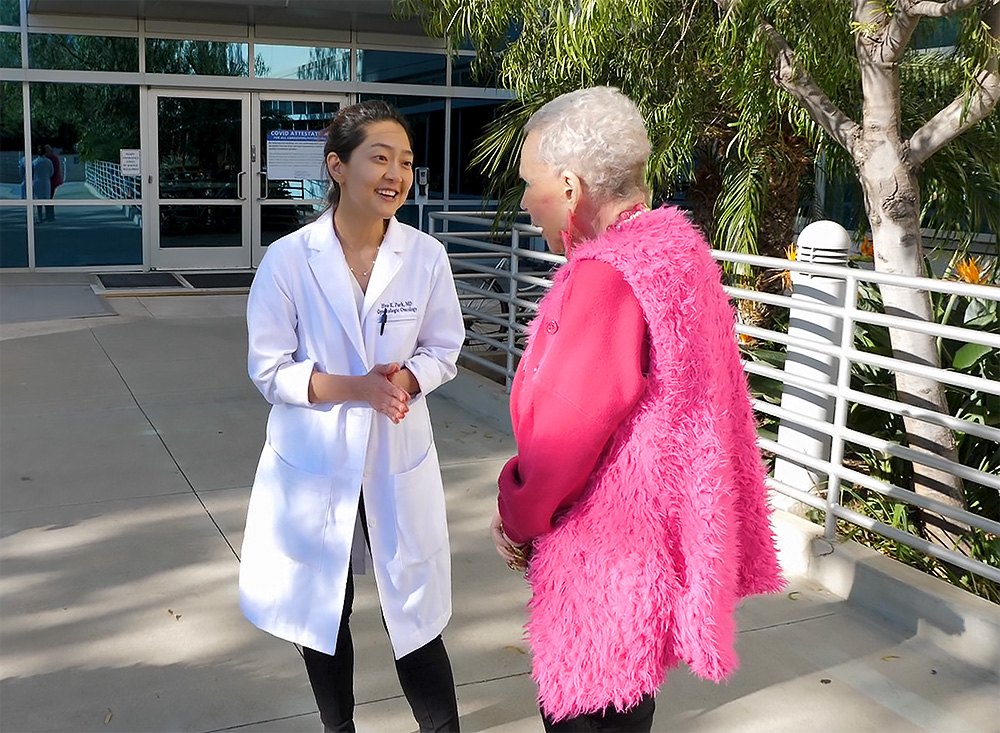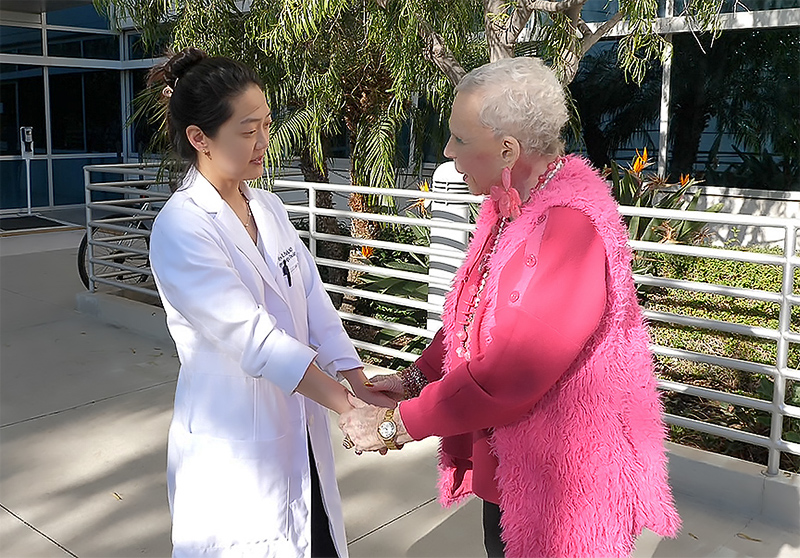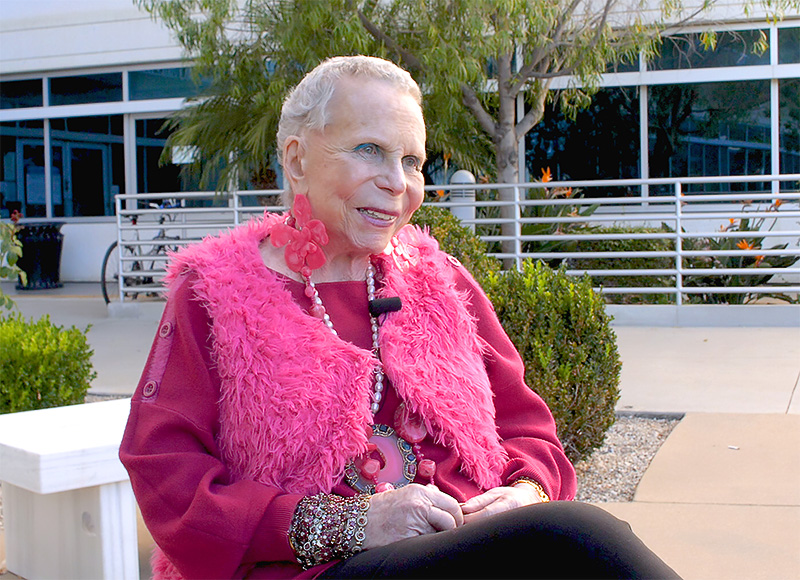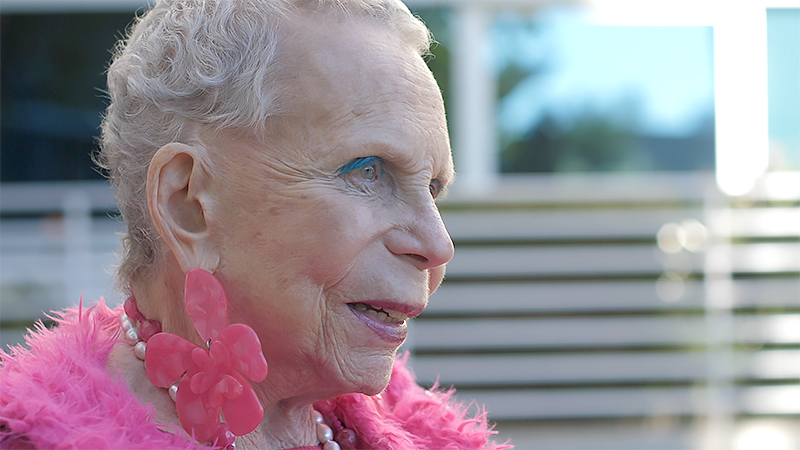
Previously Treated for Multiple Myeloma at Saint John’s, Yvonne Returns
Yvonne Kalman was diagnosed a year ago with metastatic uterine cancer at 85 years old, and today, she is that much closer to remission. Yvonne jet sets from Puerto Vallarta, Mexico to Santa Monica, California, to receive treatment at Saint John’s Health Center. “I really was so sick… I came to Los Angeles in tears,” Yvonne recalls in her testimonial. 14 years ago, she had multiple myeloma, and her medical oncologist, Dr. Sean Fischer, who treated her, recommended Dr. Hyo Park, a surgical oncologist, also at Saint John’s, who specializes in gynecologic oncology and laparoscopic surgery to treat her. “I found a warmth and tenderness from her that was unreal. I felt, ‘My God she really cares deeply about her patients,’’’ says Yvonne.
Though Yvonne came to Saint John’s fearing the worse, she knew she was in the right place because of how she was cared for previously. Immediately, her medical team of experts set her treatment into motion, offsetting many, if not all, of her deeper concerns, creating a sense of overwhelming confidence for her future.
Dr. Fischer and Dr. Park decided to prescribe systemic therapy for Yvonne due to the progression of the disease. “She received chemotherapy first rather than undergoing surgery first because she had significantly advanced pelvic disease in additional to lymph node metastasis. She would have required a much more radical surgery which I did not think would improve her outcome and possibly delay initiation of chemotherapy after surgery,” says Dr. Park.
Treatment of Metastatic Uterine Cancer
Listen to Yvonne Recount Her Incredible Journey Through Advanced Uterine Cancer
Yvonne Kalman seen interviewed by Saint John’s Cancer Institute’s Media and Marketing team in the Rose Gardens, outside the Saint John’s Health Center, November 2023.
Diagnosing Advanced Uterine Cancer
According to Dr. Park, “Yvonne’s diagnosis was made in early February of 2023 after she was evaluated in Mexico for vaginal spotting, which had been going on for about a year. Her doctor found a cervical tumor and a subsequent biopsy showed poorly differentiated malignancy. At the time, the presumed diagnosis was cervical cancer, which later changed to primary uterine cancer upon further pathologic and clinical examination. It is not uncommon that advanced uterine cancer that has grown into the cervix be initially assumed to be of cervical origin. Subsequent evaluation at St John’s and additional tumor biopsy ultimately gave her diagnosis of uterine carcinosarcoma.”
Vaginal spotting and painful intercourse are symptoms of uterine cancer, however, require image testing and a biopsy to confirm. Uterine cancer cases in the United States were around 66,200 the year Yvonne was diagnosed and treated, in 2023 (1).
Metastatic Uterine Cancer
Metastatic uterine cancer is cancer that starts in the lining of the uterus and is sometimes called endometrial cancer. It is the most common cancer of the female reproductive organs. Yvonne’s cancer spread from the uterus to the cervix, then to her lymph nodes. “While the majority of uterine cancer is diagnosed when the tumor is contained to the uterine cavity, tumor spread outside of the uterus, at time of diagnosis, is not uncommon for carcinosarcoma due to the high-risk nature of the cancer type. We knew she had tumor spread in pelvis beyond the uterus from her physical exam and knew she had lymph node metastasis from a PET scan. These lymph nodes still appeared enlarged at time of surgery, so I removed them and were positive for residual cancer,” Dr. Park notes in an email.
Uterine carcinosarcoma is a malignant and more serious tumor. It usually presents in postmenopausal women.
According to Yvonne, the surgery was 8 hours, and the first half of that was spent cleaning up scar tissue before Dr. Park could remove any tumor. “She had a lot of scar tissue of her small and large bowels in the abdomen and in the pelvis. Probably due to her prior abdominal surgery, endometriosis, and her cancer. It took about 2 to 2.5 hours of dissection to normalize the anatomy safely before we could proceed with the actual surgery,” Dr. Park remarks.
Saint John’s is very lowkey; quietly does its work and does it brilliantly.
– Yvonne
Minimally Invasive Laparoscopic Surgery
Dr. Park performs minimally invasive surgery, called laparoscopic surgery. Laparoscopic surgery is for abdominal and pelvic procedures. The incisions are small and precise, allowing for a faster recovery. Dr. Park warned Yvonne she may feel some discomfort, even pain, and would likely need painkillers. Though the surgery was intensive, according to Yvonne, she never needed painkillers afterwards, “like nothing had ever happened.”
Why Systemic Therapy for Metastatic Cancer?
Systemic therapy’s goals are to prolong survival, minimize complications, and maintain quality of life. Systemic therapies may include one or a combination of targeted therapy, immunotherapy, chemotherapy, radiation therapy, and are designed to treat the whole body. Yvonne was treated with chemotherapy, radiation therapy, and immunotherapy under the care of Dr. Fischer and Dr. Robert Wollman.
I did everything she said because I trust her implicitly.
– Yvonne
Yvonne today
Not all doctors are the same. But these two are outstanding doctors. And I’m very grateful that they’re under the same roof. And I’m very grateful that I’m a patient here.
– Yvonne
Yvonne could not be more grateful to her team of experts who prioritized her care and expedited her treatment plan. So much so, she reached out to us enthusiastically to share her story.
Yvonne’s Multidisciplinary Care Team!
Dr. Hyo Park is a gynecologic oncologist who supports the Women’s Health & Wellness Institute at Providence, Saint John’s Health Center in Santa Monica, California. Dr. Park oversaw the treatment of Yvonne for metastatic uterine cancer. Meet Dr. Park (YouTube Video).
Dr. Sean Fischer is an adjunct assistant professor of medical oncology at Saint John’s Cancer Institute who practices at Saint John’s Health Center in Santa Monica, California. Dr. Fischer previously cured Yvonne of multiple myeloma a decade ago and came up with a treatment plan with Dr. Park for metastatic uterine cancer.
Dr. Robert Wollman is the assistant professor of radiation oncology at Saint John’s Health Center in Santa Monica, California. Dr. Wollman oversaw Yvonne’s multiple radiation treatment plan with Dr. Park and Dr. Fischer for her metastatic uterine cancer.




